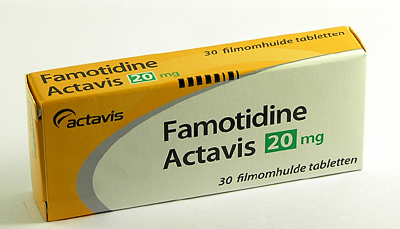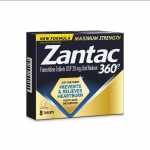What Is Famotidine Used For?

Famotidine, sold under the brand name Pepcid among others, is an histamine H₂ receptor antagonist medication that decreases stomach acid production. Prescription famotidine is used to treat ulcers (sores on the lining of the stomach or small intestine); gastroesophageal reflux disease (GERD, a condition in which backward flow of acid from the stomach causes heartburn and injury of the esophagus [tube that connects the mouth and stomach]); and conditions where the stomach produces too much acid, such as Zollinger-Ellison syndrome (tumors in the pancreas or small intestine that cause increased production of stomach acid).
Over-the-counter famotidine is used to prevent and treat heartburn due to acid indigestion and sour stomach caused by eating or drinking certain foods or drinks. Famotidine is in a class of medications called H2 blockers. It works by decreasing the amount of acid made in the stomach. Famotidine is not a controlled substance under the Controlled Substances Act (CSA).
How should this medicine be used?
Prescription famotidine comes as a tablet and a suspension (liquid) to take by mouth. It is usually taken once daily at bedtime or two to four times a day. Over-the-counter famotidine comes as a tablet, a chewable tablet, and a capsule to take by mouth. It is usually taken once or twice a day. To prevent symptoms, it is taken 15 to 60 minutes before eating foods or drinking drinks that may cause heartburn. Follow the directions on your prescription or the package label carefully, and ask your doctor or pharmacist to explain any part you do not understand. Take famotidine exactly as directed. Do not take more or less of it or take it more often or for a longer time than prescribed by your doctor.
Shake the liquid well for 5 to 10 seconds before each use to mix the medicine evenly. Swallow the tablets and capsules with a full glass of water.
Thoroughly chew the chewable tablets before swallowing them. Swallow the chewed tablet with a full glass of water.
Do not take more than two tablets, capsules, or chewable tablets of over-the-counter famotidine in 24 hours and do not take over-the-counter famotidine for longer than 2 weeks unless your doctor tells you that you should. If symptoms of heartburn, acid indigestion, or sour stomach last longer than 2 weeks, stop taking over-the-counter famotidine and call your doctor.
What side effects can this medication cause?
Famotidine may cause side effects. Tell your doctor if any of these symptoms are severe or do not go away:
- headache
- dizziness
- constipation
- diarrhea
- fussiness (in babies who take famotidine)
Some side effects can be serious. The following symptoms are uncommon, but if you experience any of them, call your doctor immediately:
- hives
- skin rash
- itching
- swelling of the face, throat, tongue, lips, eyes, hands, feet, ankles, or lower legs
- hoarseness
- difficulty breathing or swallowing
Famotidine may cause other side effects. Call your doctor if you have any unusual problems while taking this medication.
What other information should I know?
Keep all appointments with your doctor. Do not let anyone else take your medicine. Ask your pharmacist any questions you have about refilling your prescription.
It is important for you to keep a written list of all of the prescription and nonprescription (over-the-counter) medicines you are taking, as well as any products such as vitamins, minerals, or other dietary supplements. You should bring this list with you each time you visit a doctor or if you are admitted to a hospital. It is also important information to carry with you in case of emergencies.





